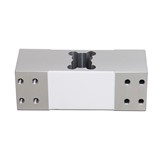"Tax plays an essential role in contributing to incentives to work, invest and save. A competitive tax system is essential to oil the wheels of the economy so they turn faster and more smoothly.
"Ai Group's proposals address key areas where taxation changes can make a difference:
- Improving Australia's business tax arrangements by reducing the burden of company tax and removing obstacles to offshore investment;
- Committing to a remodeling of the personal tax scale to boost rewards for workforce participation for lower and middle income earners and to sharpen incentives for saving and investment for higher income earners;
- Contributing to a more wide-ranging overhaul of Australia's intergovernmental relations to enable further improvements to State-based indirect tax arrangements;
- Improving the equity and adequacy of Australia's superannuation arrangements and;
- Removing barriers that individuals confront when investing in their own up-skilling.
"Tight macroeconomic circumstances should be ringing warning bells for both parties tempted to engage in populist pump priming in the lead up to the election. Nevertheless there are plenty of improvements that can be made to tax policy that better align it with major medium and longer-term economic opportunities and challenges facing Australia. Ai Group's five-point plan for tax reform to be implemented over the next three to five years depending on inflationary pressures is made up of:
- Business Tax Reforms: Phase down the company tax rate from 30% to 25%. Adopt the proposals made by the Board of Taxation in 2003 to remove barriers to offshore investment.
- Personal Taxation: Increase the Low Income Tax Offset. Extend the 15% tax bracket to $40,000, up from its present level of $30,000. Raise the threshold at which the 40% bracket begins from a level of $80,000 (from 1 July next year) to $100,000. Consider removing the 45% tax bracket above $180,000 and having a top rate of 40%.
- Indirect Tax and Intergovernmental Finances: As part of broader re-examination of federal-state finances, remove or reduce the most inefficient remaining state taxes.
- Superannuation: Refund the 15% contributions tax into lower-income individuals' superannuation accounts to raise post-retirement incomes for large numbers of people and thereby save on future age pension payments. An alternative, and possibly administratively simpler measure, would be to make direct payments into individuals' superannuation accounts as part of their end-of-year tax reconciliation. A threshold income of up to $40,000 could apply with higher thresholds set for people aged over 50 years.
- Deductibility for Skills: Remove the anomaly that prevents deductions being claimed for re-skilling and up-skilling beyond narrow limits related to existing careers.
"Taxation reform is always a work in progress and has an important role to play in renewing the national agenda for further economic and social advancement. It is not the only area but should complement policies to improve skills, education and training; to establish better approaches to infrastructure planning and coordination; to more effectively encourage the development of a more capable and more innovative business sector; to expand our international engagement and to put in place more effective environmental management while maintaining our international competitiveness," Ridout said.











